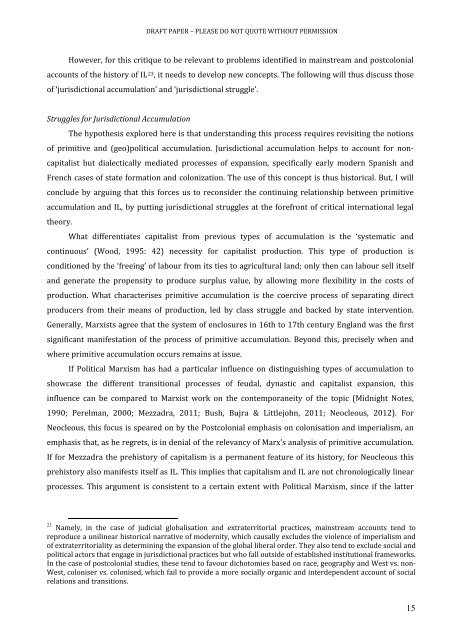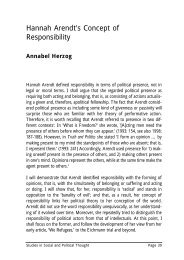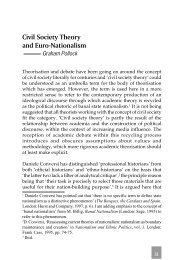Historical Materialism and International Law - University of Sussex
Historical Materialism and International Law - University of Sussex
Historical Materialism and International Law - University of Sussex
You also want an ePaper? Increase the reach of your titles
YUMPU automatically turns print PDFs into web optimized ePapers that Google loves.
DRAFT PAPER – PLEASE DO NOT QUOTE WITHOUT PERMISSION<br />
However, for this critique to be relevant to problems identified in mainstream <strong>and</strong> postcolonial<br />
accounts <strong>of</strong> the history <strong>of</strong> IL 23 , it needs to develop new concepts. The following will thus discuss those<br />
<strong>of</strong> ‘jurisdictional accumulation’ <strong>and</strong> ‘jurisdictional struggle’.<br />
Struggles for Jurisdictional Accumulation<br />
The hypothesis explored here is that underst<strong>and</strong>ing this process requires revisiting the notions<br />
<strong>of</strong> primitive <strong>and</strong> (geo)political accumulation. Jurisdictional accumulation helps to account for noncapitalist<br />
but dialectically mediated processes <strong>of</strong> expansion, specifically early modern Spanish <strong>and</strong><br />
French cases <strong>of</strong> state formation <strong>and</strong> colonization. The use <strong>of</strong> this concept is thus historical. But, I will<br />
conclude by arguing that this forces us to reconsider the continuing relationship between primitive<br />
accumulation <strong>and</strong> IL, by putting jurisdictional struggles at the forefront <strong>of</strong> critical international legal<br />
theory.<br />
What differentiates capitalist from previous types <strong>of</strong> accumulation is the ‘systematic <strong>and</strong><br />
continuous’ (Wood, 1995: 42) necessity for capitalist production. This type <strong>of</strong> production is<br />
conditioned by the ‘freeing’ <strong>of</strong> labour from its ties to agricultural l<strong>and</strong>; only then can labour sell itself<br />
<strong>and</strong> generate the propensity to produce surplus value, by allowing more flexibility in the costs <strong>of</strong><br />
production. What characterises primitive accumulation is the coercive process <strong>of</strong> separating direct<br />
producers from their means <strong>of</strong> production, led by class struggle <strong>and</strong> backed by state intervention.<br />
Generally, Marxists agree that the system <strong>of</strong> enclosures in 16th to 17th century Engl<strong>and</strong> was the first<br />
significant manifestation <strong>of</strong> the process <strong>of</strong> primitive accumulation. Beyond this, precisely when <strong>and</strong><br />
where primitive accumulation occurs remains at issue.<br />
If Political Marxism has had a particular influence on distinguishing types <strong>of</strong> accumulation to<br />
showcase the different transitional processes <strong>of</strong> feudal, dynastic <strong>and</strong> capitalist expansion, this<br />
influence can be compared to Marxist work on the contemporaneity <strong>of</strong> the topic (Midnight Notes,<br />
1990; Perelman, 2000; Mezzadra, 2011; Bush, Bujra & Littlejohn, 2011; Neocleous, 2012). For<br />
Neocleous, this focus is speared on by the Postcolonial emphasis on colonisation <strong>and</strong> imperialism, an<br />
emphasis that, as he regrets, is in denial <strong>of</strong> the relevancy <strong>of</strong> Marx’s analysis <strong>of</strong> primitive accumulation.<br />
If for Mezzadra the prehistory <strong>of</strong> capitalism is a permanent feature <strong>of</strong> its history, for Neocleous this<br />
prehistory also manifests itself as IL. This implies that capitalism <strong>and</strong> IL are not chronologically linear<br />
processes. This argument is consistent to a certain extent with Political Marxism, since if the latter<br />
23 Namely, in the case <strong>of</strong> judicial globalisation <strong>and</strong> extraterritorial practices, mainstream accounts tend to<br />
reproduce a unilinear historical narrative <strong>of</strong> modernity, which causally excludes the violence <strong>of</strong> imperialism <strong>and</strong><br />
<strong>of</strong> extraterritoriality as determining the expansion <strong>of</strong> the global liberal order. They also tend to exclude social <strong>and</strong><br />
political actors that engage in jurisdictional practices but who fall outside <strong>of</strong> established institutional frameworks.<br />
In the case <strong>of</strong> postcolonial studies, these tend to favour dichotomies based on race, geography <strong>and</strong> West vs. non-<br />
West, coloniser vs. colonised, which fail to provide a more socially organic <strong>and</strong> interdependent account <strong>of</strong> social<br />
relations <strong>and</strong> transitions.<br />
15
















